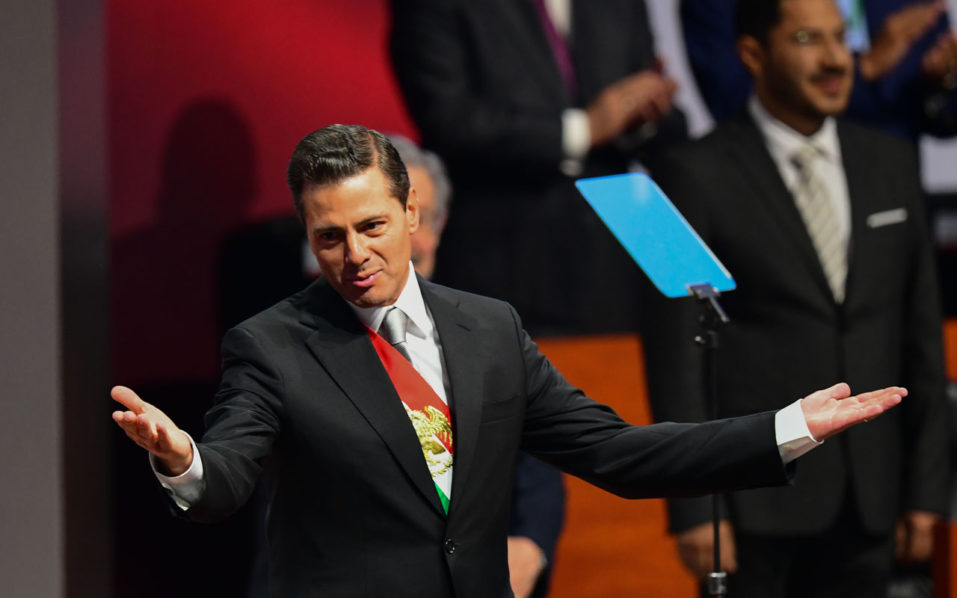 |
| Mexican President Enrique Pena Nieto gives his sixth and final State of the Nation message, at the National Palace in Mexico City on September 3, 2018. Mexican President-elect Andres Manuel Lopez Obrador takes office on December 1, after winning a landslide victory in Mexico’s July elections. / AFP PHOTO / Ronaldo SCHEMIDT |
Mexico’s deeply unpopular President Enrique Pena Nieto defended his record in his final state of the nation address Monday, touting his reforms as “transcendental” even as he acknowledged his tainted legacy.
Pena Nieto seduced voters six years ago with his movie-star looks and promises of sweeping reform, but leaves office as the most unpopular president in Mexican history, according to some polls.
He will be replaced on December 1 by anti-establishment leftist Andres Manuel Lopez Obrador, who won a landslide election victory in July by pillorying the crime and corruption he blamed on Pena Nieto and Mexico’s ruling “mafia of power.”
In his last annual progress report, Pena Nieto touted his government’s “daring agenda” of reforms, which privatized the energy sector and touched virtually every aspect of Mexicans’ lives, from education to telecommunications, labor and more.
“These structural reforms are, without a doubt, this administration’s most transcendental achievement and our most important contribution to the country’s development,” he said in a nationally televised address.
‘Shortfalls and challenges’
But he acknowledged “shortfalls and challenges,” especially his government’s failure to curb violent crime that left a record 28,702 murders last year.
“I am aware that we did not achieve our goal of bringing peace to the country. Doing so will require a sustained, long-term effort,” he said.
More than 200,000 people have been murdered in a wave of violence since Mexico deployed the army to fight drug cartels in 2006.
Lopez Obrador has proposed overhauling the national anti-crime strategy, legalizing drugs and granting an amnesty for some drug crimes.
However, the president-elect recently acknowledged there was little choice but to leave the army on the streets in the medium term, given the corruption and under-capacity plaguing the country’s police forces.
‘George Clooney of politics’
Charming his way to the presidency in 2012, his soap opera star wife by his side, Pena Nieto sold himself to voters as a fresh young reformer who would reinvent his party — the once-hegemonic Institutional Revolutionary Party (PRI) — and Mexico along with it.
The PRI had ruled Mexico as a one-party state from 1929 to 2000, until people grew so disgusted with its corruption, cronyism and abuses it had little choice but to allow free elections.
Twelve turbulent years later, Pena Nieto, then 45, managed a dazzling comeback, returning the PRI to power with a promise to restore the stability of old but usher in a new era of democracy, transparency and reform.
It all started well for the youthful ex-governor with immaculate black hair who passed a flurry of landmark reforms in rapid succession.
As Pena Nieto highlighted, he leaves behind healthy public finances, low inflation and unemployment, and a massive influx of foreign direct investment.
“This government did not just set out to administer. We dedicated ourselves to transforming Mexico,” he said.
At first, Pena Nieto made a splash on the international stage, too: The Economist magazine declared it “Mexico’s moment,” The Washington Post called him “handsome” and “popular,” and CBS News declared him “the George Clooney of politics.”
Scandals, corruption
But his administration soon became mired in scandals.
In 2014, investigative journalists revealed his wife had bought a multimillion-dollar mansion from a government contractor in a suspected sweetheart deal.
Then came the string of corruption scandals involving PRI governors, 11 of whom are now on trial, in jail, under investigation or on the run.
The problems worsened when cartel kingpin Joaquin “El Chapo” Guzman escaped from maximum-security prison in 2015.
Though he was recaptured the following year and extradited to the United States, the episode remains a major embarrassment.
The darkest stain, however, may be the disappearance of 43 students in the southern state of Guerrero in 2014.
The student activists went missing after a clash with local police, in ircumstances that remain murky.
Today, with three months left in his term, Pena Nieto’s approval rating stands at just 18 percent, according to polling firm Mitofsky.
AFP
In this article:
